Vitamin C is celebrated for its brightening, anti-ageing and protective benefits, making it a favourite in skincare routines.
But for those with sensitive skin, it can feel intimidating due to its reputation for an occasional skin irritant.
Does this powerful ingredient suit sensitive skin types?
The good news is, with the right approach and product choice, Vitamin C can work wonders even for sensitive skin.
Let’s explore how to make it a safe and effective part of your routine.
Is Vitamin C suitable for sensitive skin?
Yes, sensitive skin can use Vitamin C effectively with proper precautions and a thoughtful approach.
Pure Vitamin C (L-ascorbic acid) is highly effective due to its potency.
However, its acidic nature can cause redness, dryness or stinging for sensitive skin types.
To make Vitamin C work for sensitive skin:
Start slow
Begin with a lower concentration (5%-10%).
By beginning with a lower concentration, your skin gets time to adapt to the ingredient gradually, minimizing the risk of adverse reactions.
Choose gentle formulations
Opt for derivatives like magnesium ascorbyl phosphate, Retinyl Ascorbate or sodium ascorbyl phosphate.
These derivatives still offer the same brightening and antioxidant benefits but with a lower risk of irritation, making them ideal for individuals with sensitive skin.
Patch test
Always begin the application with a small area first to check for reactions.
This simple step ensures that your skin can tolerate the product without causing redness, stinging, or other adverse reactions, allowing you to safely incorporate it into your skincare routine.
Pair with soothing ingredients
Look for products with Hyaluronic Acid or Ceramides to counteract any dryness or tightness.
They help to strengthen the skin’s natural barrier, preventing moisture loss and potential irritation.
How does Vitamin C benefit sensitive skin?
Vitamin C is a potent antioxidant. It neutralizes free radicals caused by sun exposure, pollution, and stress.
This protects skin cells and prevents early signs of aging.
Here’s what Vitamin C can do for the skin:
Brightens skin
Vitamin C is well-known for its ability to fade dark spots, hyperpigmentation and post-inflammatory marks.
It brightens dull skin, giving you a more even and radiant complexion over time.
Stimulate collagen
As we age, collagen production naturally declines, leading to sagging and fine lines.
Vitamin C supports your skin’s ability to produce collagen, improving elasticity and reducing the appearance of wrinkles.
Protects skin from environmental stressors
As a protective shield, Vitamin C guards your skin against environmental stressors like UV rays and pollution.
While it doesn’t replace sunscreen, it enhances your skin’s resilience to external damage.
The best way to use Vitamin C if you have sensitive skin
When it comes to sensitive skin, introducing Vitamin C into your skincare routine requires a gentle approach.
To get the most out of this powerful ingredient without causing irritation, it is essential to use it the right way.
Here are some best practices to help you incorporate Vitamin C into your routine effectively and safely.
Cleanse and prep
Start with a mild cleanser enriched with glycerine, or ceramides to maintain the skin’s natural barrier and to avoid over-stripping your skin.
Apply in the morning
Vitamin C works well during the day to protect against UV damage, but always pair it with a broad-spectrum sunscreen that protects against both UVA and UVB rays.
Don’t overdo it
Using Vitamin C 2-3 times a week gives your skin time to adjust to the active ingredient, reducing the risk of irritation.
Starting slowly allows your skin to build tolerance, ensuring you get the full benefits without overwhelming or damaging the skin’s natural barrier.
Hydrate
After applying Vitamin C, follow with a soothing moisturiser containing ingredients like Ceramides or Niacinamide to lock in hydration.
This helps prevent dryness and irritation, ensuring the skin stays balanced and comfortable while maximizing Vitamin C’s benefits.
READ - The most effective way to add Vitamin C serum to your skincare routine
Does Vitamin C increase skin sensitivity?
A common concern when using Vitamin C is whether it can make the skin more sensitive.
While Vitamin C offers powerful benefits like brightening and protecting against environmental damage, its acid component can sometimes cause irritation for sensitive skin.
To avoid sensitivity ensure your skin stays balanced while using Vitamin C, it is important to follow a few key practices.
- Limit your skincare routine to one active ingredient at a time.
- Avoid high concentrations of Vitamin C formulations.
- Keep your skin hydrated to strengthen its barrier.
- Use a non-comodogenic broad spectrum sunscreen on a daily basis.
If Vitamin C feels too harsh, there are other options available.
These alternatives can deliver similar benefits without causing irritation:
- Niacinamide (Vitamin B3): It helps brighten skin, reduces redness, and strengthens the barrier. Try incorporating it with a serum with 5%-10% niacinamide.
- Azelaic Acid: This helps fade pigmentation, calms inflammation and fights acne. You may include this in your skincare in the form of cream or gel with 10%-15% concentration.
- Licorice Root Extract: It helps reduce dark spots and soothes irritated skin. Look for serums or creams with licorice root as the main ingredient.
- Green Tea Extract: It is beneficial for skin firmness as it helps neutralize free radicals and reduces redness. Use toners or serums enriched with green tea.
These alternatives provide effective results without compromising skin health.
Common myths about Vitamin C and sensitive skin
There are several misconceptions surrounding the use of Vitamin C, especially for sensitive skin.
Understanding these myths and the facts behind them can help you make more informed decisions about incorporating this powerful ingredient into your routine.
Let’s debunk some of the most common myths about Vitamin C and sensitive skin:
Myth 1: Sensitive skin can’t use Vitamin C
Sensitive skin can benefit from Vitamin C, if used correctly. The key is to start with a low concentration and use the right formulations.
Myth 2: Vitamin C Works Instantly
Vitamin C takes time. You’ll see visible results in 4-6 weeks with consistent use.
Myth 3: All Vitamin C products are the same
Not all Vitamin C is created equal.
L-ascorbic acid is the purest form but can irritate. Derivatives like magnesium ascorbyl phosphate are gentler options.
Signs of irritation from Vitamin C
Recognizing the early signs of irritation can help you adjust your routine before the reaction worsens.
Here’s what to watch for when using Vitamin C to ensure it’s working for you and not against you.
- Redness: Persistent redness or flushing after application.
- Tingling or Stinging: A burning sensation that doesn’t subside.
- Dryness or Peeling: Flaky skin in areas where the product was applied.
If you notice these signs, discontinue use and switch to a milder alternative.
Takeaway
Vitamin C can be a game-changer for your skincare routine.
The secret is selecting the right product, starting with a lower concentration, and incorporating it gradually into your routine.
If Vitamin C doesn’t work for you, don’t worry—alternatives like Niacinamide and Azelaic Acid offer similar brightening and soothing benefits with less risk of irritation.
Your sensitive skin deserves the best care, and with the right approach, you can enjoy radiant, healthy skin without any discomfort.































